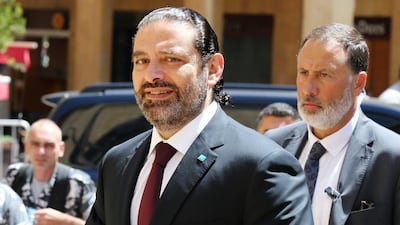The Lebanese Cabinet has not convened since late June after a deadly shoot-out near a minister’s convoy exposed major rifts between politicians, possibly endangering the six-month-old government, analysts say.
While it is not unusual for Lebanese governments to be paralysed because of political infighting, the current situation is dangerous because a third of the Cabinet supports the aggrieved Druze minister Saleh Al Gharib, Lebanese political analyst Imad Salamey told The National.
Should 11 ministers resign simultaneously, the government would automatically collapse, a scenario that happened under Saad Hariri’s previous premiership in 2011.
Mr Al Gharib’s Lebanese Democratic Party (LDP) accuses supporters of a rival Druze party, the Progressive Socialist Party (PSP), of attempting to assassinate him by opening fire on his convoy on June 30, killing two of his bodyguards.
The PSP says Mr Al Gharib’s bodyguards shot first at a crowd of protesters who were blocking his convoy because they mistakenly thought he was accompanied by controversial Foreign Minister Gebran Bassil, and that protesters fired back in self-defence.
Backed by its allies, including Hezbollah and Mr Bassil's Free Patriotic Movement, the LDP wants the investigation to be referred to the Judicial Council, but the PSP, which is allied with the prime minister’s Future Movement, refuses.
Mediation attempts between the two Druze parties have failed and LDP leader Talal Arslan refuses to budge. "Let them convene a council of ministers tomorrow. We have no problem with that. But the first item on the Cabinet's agenda should be the Judicial Council," he said in a pres conference on Monday.
Mr Salamey told The National that only crimes deemed a threat to state security are brought before the Judicial Council. "The process would carry much more political weight than if it went through a normal court. The Judicial Council would not go after the individuals who shot at Saleh Al Gharib's car, but it would aim directly at their political leadership," he said.
That means that the PSP’s leader, Walid Joumblatt, who was not in Lebanon at the time of the clashes, could be held liable for the shoot-out. This would be a fatal blow to his party, currently Lebanon’s strongest Druze formation.
The Judicial Council has sentenced Lebanese politicians to prison in the past. Lebanese Forces leader Samir Geagea spent 11 years in solitary confinement after the Judicial Council found him guilty of plotting the assassination of several Lebanese politicians during the civil war. Released in 2005, Mr Geagea has always maintained his innocence.
Analysts including Mr Salamey believe that the campaign against Mr Joumblatt is orchestrated by Damascus, which has a long history of political interference in Lebanon and supports the LDP and its allies, most notably Hezbollah. Despite collaborating for decades with the Syrian regime, Mr Joumblatt has morphed into Lebanon’s most prominent critic of Damascus.
In the meantime, Mr Hariri has not convened Cabinet, fearing an escalation of tensions. Decisions that can only be made by the government, such as the appointment of top civil servants are effectively blocked, said Wissam Lahham, a lecturer in constitutional law at Saint-Joseph University in Beirut.
Though the practice is not unheard of due to the sensitivity of Lebanese politics, the prime minister is not officially allowed to stop convening the Cabinet according to the Lebanese constitution, which says it must meet “periodically”.
However, the lack of Cabinet meetings did not prevent parliament approving the 2019 budget on July 19, which has been the government’s main priority as it tries to implement reforms to avoid a looming economic crisis. The budget was ratified Wednesday by President Michel Aoun, despite a last-minute controversy regarding the inclusion of an article related to the confessional allocation of state jobs.
One way for the government to meet without sectarian sensitivities flaring up again would be to convene without the three Druze ministers, which include two PSP loyalists and Mr Al Gharib, who is minister for refugee affairs, said Mr Salamey.
Albeit a convenient solution, it would be criticised for violating the 1943 National Pact, which requires the inclusion of representatives of the country’s main religious groups, he warned.
In 2006, all five Shiite Muslim ministers submitted their resignation a few days ahead of discussions regarding a tribunal for those suspected of killing Prime Minister Rafic Hariri the previous year, as fingers pointed towards Syria, an ally of Lebanon’s main Shiite party, Hezbollah.
Then Prime Minister Fouad Siniora rejected their resignation and convened the Cabinet without them, but the meetings were considered illegitimate by both the Shiite speaker of Parliament and the Christian Maronite President, and remain a source of controversy to this day.

